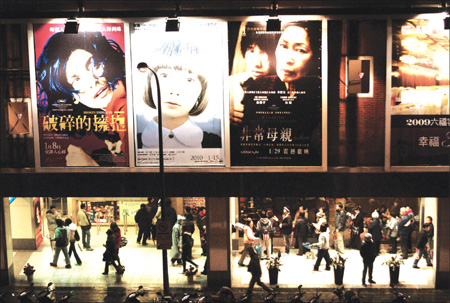Lawmakers pass culture stimulus bill
Updated: 2010-01-08 07:40
(HK Edition)
|
|||||||
|
People line up to buy movie tickets for a new release at a theater in Taipei yesterday. The Legislative Yuan passed a bill yesterday designed to foster the creative and culture industry with measures such as government compensation for discounted admission to see Taiwanese-made films. CNA |
TAIPEI: After its third reading, the legislature passed a bill yesterday on the promotion of the cultural and creative industries, which stipulates that enterprises or individuals will be entitled to tax deductions for up to five years if they hold stocks in cultural and creative companies for at least two years.
The law stipulates that for enterprises, the amount of tax deductible should not surpass 20 percent of the value of the stocks they hold.
For individuals, the amount of tax deductible should not surpass 10 percent of the stock value, and the amount of tax deductible every year should not surpass 50 percent of the individual's income tax payable that year.
In addition, the law also stipulates that enterprises that donate tickets to cultural and art shows to students and members of less-privileged groups will be able to deduct taxes with their contributions, with the amount - less than NT$10 million or 10 percent of the annual turnover of the business donor, whichever is smaller - listed as expenses or losses for the year.
Under the law, the public will also be able to enjoy discounts for tickets of Taiwam-made movies, with the discount compensated by the government.
Legislator Hung Hsiu-chu of the ruling Kuomintang (KMT), who chaired the negotiations for the bill, said the discounts will be reflected directly in ticket prices.
For example, she said, if the original ticket price for a locally-produced movie is NT$200, the government discount will bring the price down to NT$150.
The law will also provide a legal basis for the government to make cultural art show vouchers available to elementary and junior high school students.
It also stipulates that the government should contribute toward and help set up an institute for developing cultural and creative industries, protect the budget needed for developing these industries, and offer aesthetics, cultural and creative arts-related courses for elementary and junior high school students.
Meanwhile, in a move to attract high-quality entertainment, the southern port city of Kaohsiung is planning to propose a bill to allow deductions in local taxes for cultural and creative industries by the end of March, a city government official said yesterday.
Lei Chung-dar, director-general of Finance Bureau of Kaohsiung City government, said the plan is expected to bring more cultural activities or performances to Kaohsiung, although it may lower the total tax revenue of the city.
According to the city's Finance Bureau, its local entertainment tax revenue totaled NT$120 million in 2009 with tax revenue from concerts amounting to several millions of New Taiwan dollars.
Lei said the concert of Taiwanese rock band Mayday, which was held last December, brought the city the highest tax revenue from concerts last year.
As the rock band's concert had been approved by the Council of Cultural Affairs as a cultural and creative performance, the standard tax rate of 5 percent was cut in half, with the total tax payable being NT$3 million.
Lei also announced yesterday that in order to enhance the level of cultural and arts performances in the city, Kaohsiung will invite many international performers to perform there this year, including Yo-Yo Ma, a world-famous Chinese-American cellist; and Jose Carreras, a Spanish Catalan tenor who gained fame as one of The Three Tenors.
China Daily/CNA
(HK Edition 01/08/2010 page2)
